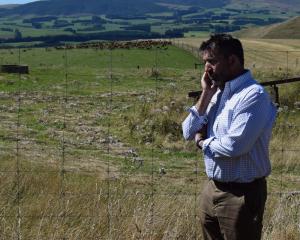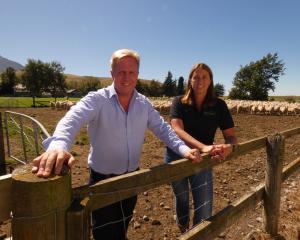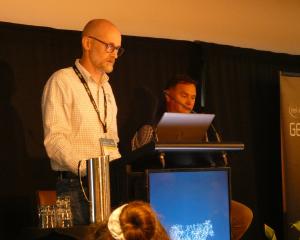
To make that even harder, they also have to deal with Generation Z, a group of youngsters born in the late 1990s who have never known life without the internet.
Helping guide them in the right direction is Michael McQueen, an Australian trend forecaster and bestselling author who was a speaker at the Red Meat Sector Conference in Auckland earlier this month.
"You tend to hear about the future spoken in really glowing terms like it’s all just opportunity or it’s all just really scary and neither of those is correct.
"The reality is the future is just going to be very different and we all know that the pace of change has never been as fast and it will never be slow again.
"Those sorts of sentiments we are familiar with, but I think there’s some really exciting stuff ahead for the industry, but also some challenges that will need to be confronted."
Mr McQueen said AI could help the industry be far more productive and streamlined, and it was helping Australasian producers finding it difficult to get staff.
United States company Tyson Foods had spent $1.3 billion upgrading the use of technology in their factories and processing facilities, because they were struggling to get staff.
AI was not about taking jobs away from the industry, but about getting better, he said.
It was possible now to take a video on an iPhone of a worker doing repetitive tasks with AI analysing the movements and body parts most at risk of repetitive strain injuries.
tim.cronshaw@alliedpress.co.nz
Some companies had seen worker compensation costs reduced 30% by using these tools to identify risk areas.
Exoskeletons were being used in Australia as wearable structures to support and protect bodies during heavy work.
Generative AI and ChatGPT was having an impact on the back-end administration.
Mr McQueen said he could see advances extending to the farm.
"It depends on the types of farms, but I’ve done a lot of work particularly in Australia with some cropping farmers who are using a lot of technology and robotics, and in fact there is carbon robotics which produce essentially these big robots for identifying weeds using AI and actually zap the weeds rather than using any herbicides on the land, so it doesn’t disturb the soil or add any herbicides, it just literally moves across the weeds like a driverless car 24/7 scanning, identifying weeds and zapping them with lasers."
He said the expensive technology could be expected to become less prohibitive with greater uptake and was a "phenomenal" step forward for reducing chemicals and controlling weeds.
Affordable drones were being used to spray crops, identify soil moisture levels and pick fruit.
Technology had always been part of the equation in farming, but could be expected to play an even larger role ahead, he said.
Mr McQueen said governments were doing a lot of work trying to identify AI risks, the jobs which might be affected and the roles of employers to ensure staff were supported.
He said individuals still needed to continue upskilling as technology could be a great tool.
"AI is unlikely to take your job necessarily, but a human using AI might.
"It’s a case of the technology is there and how do we use it as a new tool.
"There’s a lot of work at government level around this."
Fast arriving are air taxis by companies such as Joby Aviation, which were looking to roll out a network of passenger drones.
Mr McQueen said they were looking to have the first one opened in Brisbane in time for the 2032 Olympics.
"We will probably see some of these passenger drones — particularly in a country like New Zealand where people are scattered over often quite large distances — be a real gift for ferrying people around the country fairly quickly and significantly faster than driving.
"It means for shorter journeys we will probably see drones increasingly common.
"A number of the airlines are realising where the world is heading so United Airlines and American Airlines place big investments into passenger drones to get people to airports where they can then catch traditional planes."
Drone delivery of rural goods could increasingly be part of this landscape and in Scotland the Royal Mail had just rolled out a drone delivery service for outlying islands, he said.
Mr McQueen said Gen Z thought differently and the big thing for farmers to be aware of was their core values, particularly as consumers.
They were driven by sustainability and were unwilling to connect to buy goods or work in an industry unless it was committed to this.
"From a farming perspective, having clarity around that you’re making sure you’re doing things that are environmentally sustainable is important and the key thing is to communicate it.
"An industry can be doing great stuff, but ... the perception is the industry is dragging its heels and in most cases that’s not true."
Many Gen Zs were consuming meat-free meals such as cultured or plant-based meats because they thought it was better for the environment, carbon emissions and for them.
"The reality is a lot of these plant-based substitutes are full of salt and all sorts of preservatives and things that are actually not great for you, so I think we are seeing a wee bit of a push back from consumers.
"Maybe actually getting good-quality lean meat that’s been sustainably sourced or cultivated is a better option for me and the planet than getting plant-based alternatives.
"I think we are going to start to see that change a little bit and it’s already begun to shift."
Farmers need to stay in the position of being a "student, not critic", and stay curious about change, as seeing new things as just threats would mean opportunities were lost.
The worst thing anyone could do to Gen Z was patronise them, refuse them a voice at the table or assume that because they were young they had nothing to contribute, Mr McQueen said.














